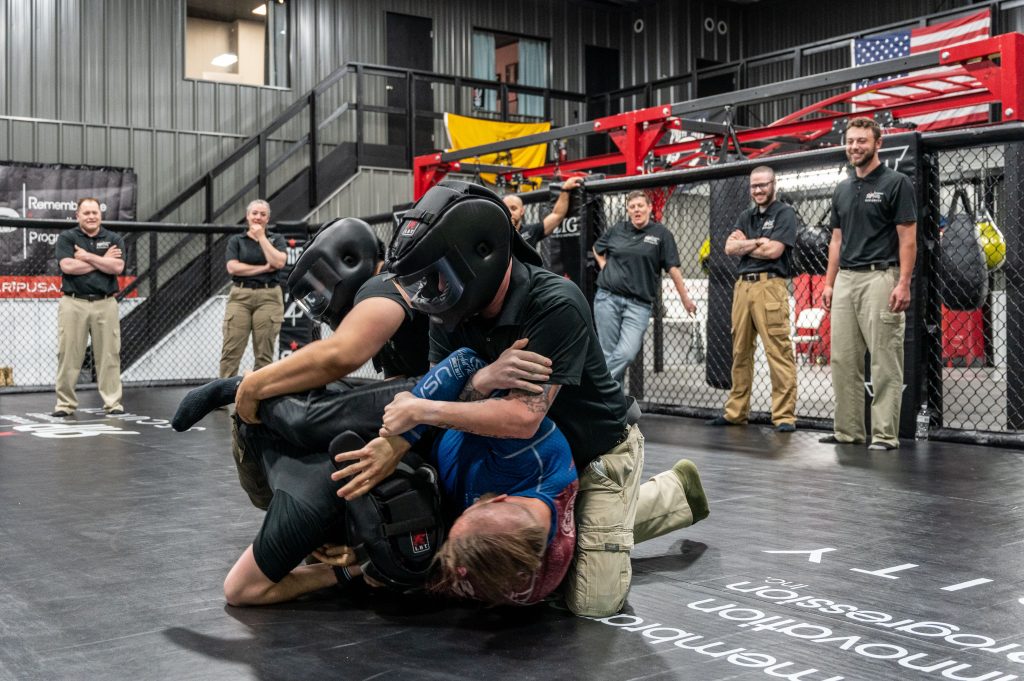What is Reality-Based Training (RBT)?
Reality-Based Training (RBT) is a type of training method or learning approach that involves intentionally introducing stress or pressure to enhance performance or resilience. Individuals are exposed to challenging or stressful situations to improve their ability to handle pressure, make decisions under stress, or adapt to unexpected circumstances.
By incorporating stress-inducing elements and real-life scenarios, the goal is to push individuals beyond their comfort zones, promoting adaptation and improved overall stress responses.
By incorporating stress-inducing elements and real-life scenarios, the goal is to push individuals beyond their comfort zones, promoting adaptation and improved overall stress responses.
Why is RBT Important for Law Enforcement (LE)?
RBT holds paramount importance for law enforcement officers (LEOs) as it replicates the high-pressure situations they will encounter in the field, offering a controlled environment to hone crucial skills. This type of training provides realistic simulations, allowing officers to navigate scenarios that demand quick thinking and decisive action.
The intensity of stress-induced training enhances officers' ability to make effective decisions under pressure, contributing to improved reaction times and the development of essential emotional regulation skills.
Moreover, such training fosters teamwork, enhancing coordination among officers, and instills adaptability by exposing them to unpredictable situations. Perhaps most crucially, RBT builds resilience, preparing officers to handle the psychological and emotional challenges inherent in their profession.
By simulating real-world stressors, this training model not only improves skill retention but also ensures that LE personnel are well-prepared to face the dynamic and demanding nature of their responsibilities with professionalism and competence.
The intensity of stress-induced training enhances officers' ability to make effective decisions under pressure, contributing to improved reaction times and the development of essential emotional regulation skills.
Moreover, such training fosters teamwork, enhancing coordination among officers, and instills adaptability by exposing them to unpredictable situations. Perhaps most crucially, RBT builds resilience, preparing officers to handle the psychological and emotional challenges inherent in their profession.
By simulating real-world stressors, this training model not only improves skill retention but also ensures that LE personnel are well-prepared to face the dynamic and demanding nature of their responsibilities with professionalism and competence.
Benefits of RBT for LE...
RBT for LEOs, often referred to as "stress inoculation" or "stress induced training," aims to prepare officers for the challenging and high-pressure situations they will encounter in their line of duty. Here are some potential benefits
- Realistic Simulation: RBT provides a more realistic simulation of the types of situations LEOs may face in the field. This helps officers develop and practice their skills in a controlled environment.
- Decision-Making Under Pressure: It enhances the ability of officers to make effective decisions under stress. By exposing them to simulated high-stress scenarios, officers can learn to manage their stress responses and make sound judgments.
- Improved Reaction Time: Training under stress conditions can lead to improved reaction times. This is crucial in situations where quick and accurate responses are necessary to ensure the safety of the officer and the public.
- Enhanced Team Coordination: RBT often involves teamwork, fostering better coordination and communication among officers. This is important in situations that require a collective response.
- Emotional Regulation: Officers learn to regulate their emotions and manage stress, reducing the likelihood of panic or making impulsive decisions. This can contribute to maintaining professionalism in challenging situations.
- Resilience Building: Exposure to stress in a controlled training environment helps build psychological resilience. Officers become better equipped to handle the emotional and psychological challenges associated with their profession.
- Adaptability: RBT encourages adaptability by exposing officers to unpredictable scenarios. This can help them develop a flexible mindset and the ability to adjust their approach based on the evolving situation.
- Skill Retention: The RBT model can contribute to better retention of skills and knowledge. By practicing under stress, officers are more likely to recall and apply their training in real-world situations.
Science-Based Approach to LE Training...
Every effective police officer training program must be grounded in evidence-based methodologies rather than fleeting trends. The abundance of scientific evidence strongly supports the efficacy of RBT as a potent method for overcoming stress and solidifying task proficiency within the realm of police training.
RBT, embedded within the framework of cognitive behavior therapy and Stress Inoculation Training, stands out as a scientifically validated approach. The military's adoption of similar cutting-edge concepts underscores its effectiveness in enhancing performance.
Understanding the dynamics of human performance under stress and recognizing the advantages of stress inoculation through realistic scenario training, I contend that formal RBT stands as the optimal method for training and assessing tactics and officer proficiency.
This methodology goes beyond merely demonstrating knowledge of policies, extending to showcasing practical skills. In the unpredictable and infrequently occurring situations that LEOs face, RBT emerges as a crucial tool to prepare officers comprehensively and effectively for the challenges of their profession.
RBT, embedded within the framework of cognitive behavior therapy and Stress Inoculation Training, stands out as a scientifically validated approach. The military's adoption of similar cutting-edge concepts underscores its effectiveness in enhancing performance.
Understanding the dynamics of human performance under stress and recognizing the advantages of stress inoculation through realistic scenario training, I contend that formal RBT stands as the optimal method for training and assessing tactics and officer proficiency.
This methodology goes beyond merely demonstrating knowledge of policies, extending to showcasing practical skills. In the unpredictable and infrequently occurring situations that LEOs face, RBT emerges as a crucial tool to prepare officers comprehensively and effectively for the challenges of their profession.
How to Incorporate RBT at your Agency...
Science-driven data shows the benefits of enhancing your agency's training with a RBT program. We owe it to our officers to prepare them for the challenges they will encounter by providing them with proper training.
To equip yourself and your team with the necessary skills and knowledge to successfully implement an RBT training program, Attend one of our Level 2 Advanced Instructor Courses. This comprehensive program delves into crucial aspects, including understanding the impact of stress and fear on human performance, safe instruction of RBT, designing effective drills, coaching during RBT scenarios, and conducting thorough Use of Force Reviews. Additionally, the course addresses specialized skills like Vehicle Extractions.
To equip yourself and your team with the necessary skills and knowledge to successfully implement an RBT training program, Attend one of our Level 2 Advanced Instructor Courses. This comprehensive program delves into crucial aspects, including understanding the impact of stress and fear on human performance, safe instruction of RBT, designing effective drills, coaching during RBT scenarios, and conducting thorough Use of Force Reviews. Additionally, the course addresses specialized skills like Vehicle Extractions.

